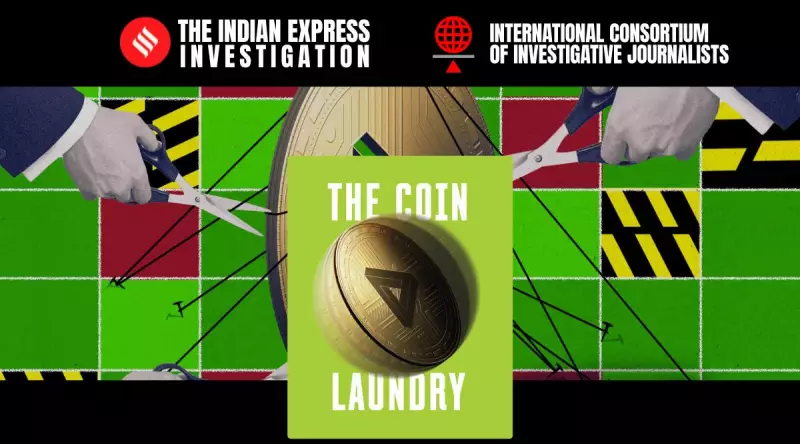
Massive Crypto Money Laundering Operation Uncovered
In a startling revelation that has sent shockwaves through India's financial sector, government authorities have identified at least 27 cryptocurrency exchanges being used as conduits for laundering massive amounts of illegally obtained money. According to official data, these platforms facilitated the laundering of Rs 623.63 crore siphoned from 2,872 victims over a 21-month period between January 2024 and September 2025.
The investigation, based on data compiled from the National Cybercrime Reporting Portal (NCRP), has exposed what cybercrime investigators are calling the most sophisticated financial laundering model to emerge from India's digital crime ecosystem. The Ministry of Home Affairs (MHA) has flagged these Virtual Asset Service Providers (VASPs) after detailed analysis by the Indian Cyber Crime Coordination Centre (I4C).
The Scale of Criminal Operations
The numbers reveal an alarming pattern of cybercrime operations targeting Indian citizens. During the 2024-2025 period, crime proceeds worth Rs 25.3 crore reported in 769 complaints were transferred via 12 foreign crypto exchanges using credit and debit cards. However, this pales in comparison to the massive amounts routed through domestic platforms.
IC4's detailed analysis of NCRP data shows that crime proceeds worth Rs 200 crore reported in 1,608 complaints received until September 30 were routed to Indian VASPs. Another Rs 423.91 crore reported in 1,264 complaints was transferred during the previous year.
Officials familiar with the investigation revealed that victims primarily invested through fake trading or investment applications, completely unaware that their funds were being converted into digital assets and layered through dozens of cryptocurrency wallets to hide the money trail.
Industry Response and Defense
Among the exchanges flagged by the MHA are several prominent platforms including Coin DCX, WazirX, Giottus, ZebPay, Mudrex and CoinSwitch, primarily due to their significant market shares in the Indian cryptocurrency ecosystem.
When approached for comments, these exchanges offered strong defenses of their operations. CoinSwitch clarified categorically that no such transfers occurred through their platform, emphasizing that they operate within a fully ringfenced and compliant environment specifically designed to prevent any misuse.
CoinDCX, while citing confidentiality obligations that prevent disclosure of case-specific details, highlighted their advanced security protocols including multi-signature and multi-party computation (MPC) wallets to ensure safe handling of seized assets.
Pranjal Agarwal, market head at Mudrex, pointed out that all platforms registered with FIU since 2023 have resolved any issues related to KYC verification and anti-money laundering screening that might have existed previously. As reporting entities, we regularly file suspicious transaction reports, Agarwal stated.
Vikram Subburaj, CEO of Giottus crypto platform, offered an interesting analogy to explain their position: If a person with a criminal background were to order food on Swiggy or hail a cab through Ola, it would not make those platforms complicit in any crime that he has committed or would commit. The same principle applies to all FIU-registered crypto exchanges.
Broader Regulatory Challenges
The investigation has revealed several systemic challenges facing India's cryptocurrency industry. Beyond KYC compliance and AML screening, inadequate grievance redressal mechanisms at many exchanges and technical glitches causing delays in fund withdrawals have led to significant backlash from platform users.
Recent security breaches at some of India's largest crypto exchanges have further shaken user confidence. Nischal Shetty, co-founder of WazirX, which lost $235 million in a major hacking incident in July 2024, blamed the breach on third-party issues. The WazirX server was not breached but a third-party custody server was compromised, Shetty explained, adding that they have already paid back 85% of their liabilities and relaunched with enhanced security measures.
The ownership structure of several top Indian crypto platforms has also come under scrutiny, with many functioning under foreign holding companies. Industry insiders describe this arrangement as operating in a trust and oversight vacuum, though many platforms downplay this as common practice for fintech startups seeking easier capital raising through holding companies in convenient jurisdictions.
The reluctance of some crypto exchanges to pay 18% GST for intermediary services provided for trading has further strained relations between the industry and government authorities. The Finance Ministry reported GST evasion of Rs 824.14 crore by 17 crypto exchanges, with recovery of Rs 122.29 crore, including interest and penalties, by December 2024.
Ongoing Investigations and Future Implications
The Enforcement Directorate and Financial Intelligence Unit are now probing whether Indian intermediaries are functioning as crypto mules, converting scam proceeds into tokens for commission. Investigators are also examining whether VASP compliance failures allowed unverified accounts to bypass KYC processes.
In its analysis of NCRP data, the IC4 identified that the single largest fraudulent transfer – Rs 10.09 crore – passed through UK/US-based Onlychain Vilnius. The second largest transfer – Rs 8.13 crore – passed through Mauritius-based Ezipay Ebene.
While Onlychain Vilnius did not respond to requests for comment, Ezipay denied being a cryptocurrency service, stating they do not advertise or provide crypto-related products directly or indirectly and that all transactions are conducted through card-based remittances subject to full regulatory compliance.
As the investigation continues, officials warn that the Rs 623.63 crore in recorded crime proceeds represents only the tip of the iceberg, indicating how even Indian crypto exchanges registered with the FIU are not immune to misuse by cyber criminals who increasingly rely on peer-to-peer routes or rogue crypto platforms to channel illegal money.






